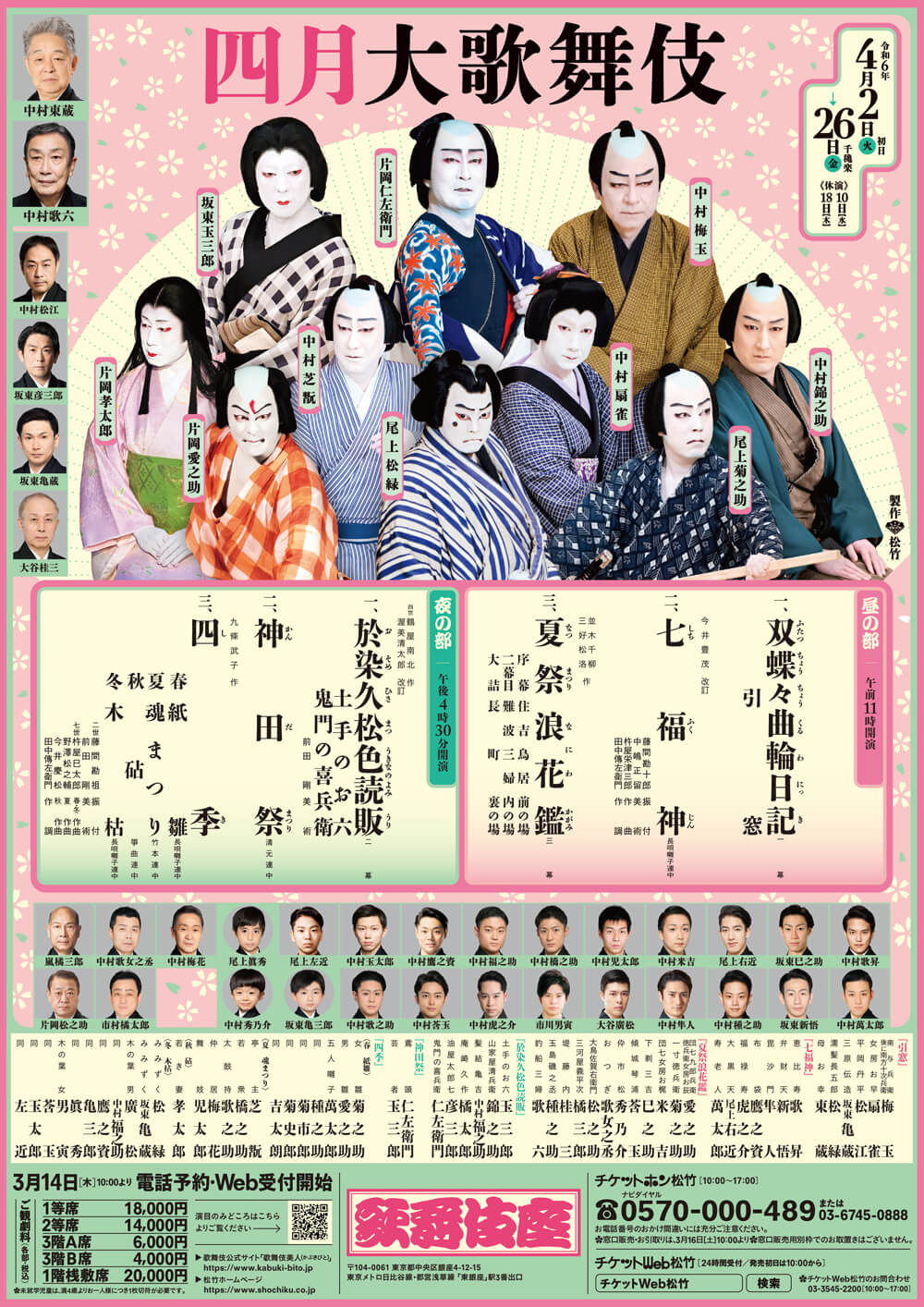Kabukiza Theatre
April Program at the Kabukiza Theatre
Daily: Apr 02 (Tue) - Apr 26 (Fri), 2024
Matinee:11:00 AM
Evening Show: 4:30 PM
*No performances on the 10th (Wed) and 18th (Thu).
[Important Notice]
●Precautionary Measures at the Kabukiza Theatre
On sale: from Mar 14 (Thu), 2024 10:00 AM(JST)
Box Seat: 20,000 /First Class Seat: 18,000 /Second Class Seat: 14,000 /Upper Tier A: 6,000 /Upper Tier B: 4,000
Unit: Japanese Yen (tax included)
*Children over the age of 4 must purchase tickets to enter.
*Tea will not be offered at the Box Seats.
Kabukiza Theatre (at TOKYO) Theatre Information
- Single Act Tickets
- *Online Single Act Tickets will go on sale from the day before the performance date at 12:00PM (noon).
*Tickets for dates shown as "Sold Out" or for other preferred seating areas, may still be available from the promoter, Shochiku Co., Ltd. Please confirm the availability by phone or stop by the Box Office.
*Simplified English Audio Guide available (1,000 yen, cash only; brief description and synopsis only).
*Free English flyer/Sold program (Detailed English synopses are found at the end of the Japanese program) available.
The Matinee begins with a 'sewamono', a domestic play telling a painful story of family affection through the experiences of a sumō wrestler. It is followed by an auspicious dance, and ends with another famous domestic play based on a real event.
In the Evening Program you can enjoy a domestic play by the famous kabuki playwright Tsuruya Nanboku, a dance depicting a festival in Edo (the old name for Tokyo) and another dance portraying the beauty of the four seasons in Japan.
 Kabukiza Theatre Stage Photo
Kabukiza Theatre Stage Photo
FUTATSU CHŌCHŌ KURUWA NIKKI
Hikimado
['The Skylight' from 'A Diary of Two Butterflies in the Pleasure Quarters']
CAST :
- Nan Yohē, later Nanpō Jūjibē
- Nakamura Baigyoku
- Ohaya, Yohē's wife
- Nakamura Senjaku
- Nuregami Chōgorō
- Onoe Shōroku
- Okō, Chōgorō's mother
- Nakamura Tōzō
STORY :
A sumō wrestler named Nuregami Chōgorō has killed a man to save another to whom he was indebted and is now on the run. He takes refuge at the home of his mother whom he has not seen in years. Unfortunately, her step-child Yohē is now a local magistrate and has been ordered to search for and arrest Chōgorō. The mother is caught in a dilemma between love for her real son and duty towards her stepson. Yohē realizes Chōgorō's true identity and, sympathizing with his step-mother, he lets him escape. Chōgorō departs, thanking Yohē for the favor to his family. These complicated conflicts are symbolized by the light and dark created by the humble skylight, as a rope is pulled to open or close its wooden shutter.
Intermission: 35 minutes
SHICHIFUKUJIN
['The Seven Gods of Good Fortune']
CAST :
- Ebisu (God of Fishing and Commerce)
- Nakamura Kashō
- Benzaiten (Goddess of Music and Wealth)
- Bandō Shingo
- Bishamon (Vaisravana)
- Nakamura Hayato
- Hotei (A pot-bellied God of Good Luck)
- Nakamura Takanosuke
- Fukurokuju (God of Welfare and Longevity)
- Nakamura Toranosuke
- Daikokuten (Mahakana, God of Wealth)
- Onoe Ukon
- Jurōjin (God of Longevity)
- Nakamura Mantarō
STORY :
A treasure ship on which the Seven Gods of Good Fortune pose appears on the waves. They get excited after toasting again and again. They portray a courtesan and her lover in the pleasure quarters in dance and then dance praying for peace across the land.
Intermission: 25 minutes
NATSU MATSURI NANIWA KAGAMI
–Sumiyoshi Torii Mae, Nanba Sabu Uchi, Nagamachi Ura
['The Summer Festival in Old Osaka -The Sumiyoshi Shrine, Sabu's House and the Back Alley at Nagamachi']
CAST :
- Danshichi Kurobē / Otatsu, Tokubē's wife
- Kataoka Ainosuke
- Issun Tokubē
- Onoe Kikunosuke
- Okaji, Danshichi's wife
- Nakamura Yonekichi
- Kotoura, a courtesan
- Nakamura Kangyoku
- Tamashima Isonojō
- Nakamura Tanenosuke
- Tsurifune no Sabu
- Nakamura Karoku
STORY :
This is a 'sewamono' play, a work portraying in a realistic way the lives of ordinary people in the Edo period (1603-1868).
This popular work portrays the pride of a chivalrous man in old Osaka. Danshichi, a gallant fishmonger, does everything he can to protect the son of his patron with his companions Tokubē and Sabu. Even Tokubē's wife heroically helps out by sacrificing her beautiful face. But in the end, Danshichi is betrayed by his evil father-in-law Giheiji. In the famous climax of the play, Danshichi is forced to kill Giheiji in a muddy field down a lonely back alley. As the two struggle desperately using real water and mud, Danshichi's beautiful tattoos are exposed and they strike a series of magnificent poses. In the background we hear the shouts of local festival-goers nearby.
OSOME HISAMATSU UKINA NO YOMIURI
Dote no Oroku, Kimon no Kihē
['The Scandalous Love of Osome and Hisamatsu']
CAST :
- Dote no Oroku
- Bandō Tamasaburō
- Yamagaya Seibē
- Nakamura Kinnosuke
- Kamekichi, a barber
- Nakamura Fukunosuke
- Kimon no Kihē
- Kataoka Nizaemon
STORY :
This is a play written by Tsuruya Nanboku IV in the early 19th century, and this scene in particular reflects the decadence and corruption found in the underbelly of society at that time. The scenes portray two outwardly charming characters who are, in fact, extremely wicked. There are several typical 'role types' that appear in kabuki, and the 'akuba' (wicked lady) is one of them. Oroku is an 'akuba', and although beautiful, she appears to be truly wicked.
Trying to extort 100 gold coins, Oroku and her husband Kihē visit a pawnshop carrying a dead body. Claiming the corpse to be Oroku's brother, the pair insists that he died from an injury he incurred in a quarrel with the shop's apprentice. However, the dead body suddenly regains consciousness and the extortion ends in failure. Although disappointed, the two leave the pawnshop without flinching in the slightest.
Intermission: 35 minutes
KANDA MATSURI
['The Kanda Festival']
CAST :
- Chief of a firefighting troop
- Kataoka Nizaemon
- A geisha
- Bandō Tamasaburō
STORY :
The gallant commoners of Edo's neighborhoods loved nothing better than a festival, and this is a dance based on one of the biggest festivals in Edo (the old name for Tokyo). In this dance, a gallant fireman and a geisha appear and display their 'Edo-style' spirit. In the end, a young man comes out and a beautiful fight scene unfolds on stage.
Intermission: 20 minutes
SHIKI
['The Four Seasons']
CAST :
- Empress doll
- Onoe Kikunosuke
- Emperor doll
- Kataoka Ainosuke
- Proprietor
- Nakamura Shikan
- A young actor
- Nakamura Hashinosuke
- A maiko
- Nakamura Kotarō
- A young wife
- Kataoka Takatarō
- Horned Owl
- Onoe Shōroku
- Horned Owl
- Bandō Kamezō
<Haru: Kamibina>[Spring: Paper dolls]
<Natsu: Tama Matsuri> [Summer: The Obon Festival]
<Aki: Kinuta>[Autumn: Fulling Block]
<Fuyu: Kogarashi> [Winter: Cold Wintry Wind]
STORY :
This dance portrays the four seasons in Japan beautifully. Paper dolls representing a happy couple in spring, the emotional dance of a young proprietor and others against the background of giant bonfires on the mountainside in summer, a young wife who thinks of her husband in autumn, as a poem by Li Po describes, as well as whirling leaves in a cold wind in winter.


